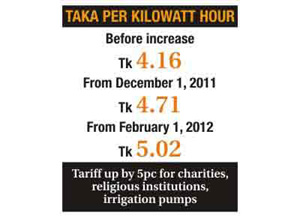Retail level users to pay 13pc higher effective from Dec 1, another 7pc hike from Feb 1; rise draws flak
Electricity price has gone up by Tk 0.55 per unit from December 1 for all retail customers across the country, dealing a blow to general users who consume less.
The price of per kilowatt hour electricity has soared by 13.24 percent to Tk 4.71 in the first phase of the two-stage increment, said Syed Yusuf Hossain, chairman of Bangladesh Energy Regulatory Commission (BERC).
The energy regulator will again increase the retail tariff by 7.09 percent on February 1 next year, taking the per unit price to Tk 5.02, which is 21.28 percent up from last month’s Tk 4.16.
Yusuf, who announced the hike at a press conference at his office in the city yesterday, also said the authorities had increased power tariff by 5 percent for charities, irrigation pumps and religious institutions.
 This is the second rise in retail power tariff this year. On February 8, BERC increased the average retail electricity tariff by 5 percent.
This is the second rise in retail power tariff this year. On February 8, BERC increased the average retail electricity tariff by 5 percent.
Yusuf said the increase in electricity price would help the government save about Tk 1,000 crore in annual subsidies. He, however, said the estimate was not final.
“The government is paying a huge amount of money for energy subsidies, contributing to rising inflation and higher bank borrowing. This price hike will ease the pressure on government coffers.”
The former bureaucrat said although the authorities were increasing power tariff for such users as agricultural pumps, religious institutions, charities and the rural poor, the commission has tried to keep the hike within tolerable levels.
“Although these are sensitive areas, we have to increase their tariff as we cannot forget that electricity price in Bangladesh is the lowest in the world,” he said.
However, news of the hike drew criticism from analysts and consumer rights groups.
Akbar Ali Khan, former caretaker government adviser, said the rise would have an impact on inflation, directly and mostly indirectly. “Production cost will increase as direct impact. Indirectly, it will create pressure on inflation and the price of products will go up.”
The government could make two to three thousand crore taka by hiking the prices, he said. “But the government is running a budget of one lakh and 60 thousand crore taka. It should have thought while preparing the budget if it would be able to deliver or not.”
He also said the production cost of electricity was very high in Bangladesh. “Electricity is not being produced in the most efficient way. Nobody is talking about improving management. I think reducing production cost can be one answer to subsidies.”
Quazi Faruque, president of Consumers Association of Bangladesh, said the new tariff was a double whammy for ordinary people. “On one hand, they will buy electricity at higher prices. On the other, they will pay more to buy industrial items which are produced through using electricity.”
“It is unfortunate. This will only worsen ordinary people’s economic conditions,” he told The Daily Star over the phone.
Yesterday’s price hike came a month after the bulk power price was increased by 16.79 percent to Tk 3.27 a unit, which took effect on December 1.
From now on, distributor-wise, customers will enjoy different price levels as the country’s five power suppliers maintain different tariffs for different groups.
Customers of Bangladesh Power Development Board, the country’s lone buyer of electricity from generation companies, will pay 13.62 percent more from December 1 and 6.74 percent more from February 1.
Rural Electrification Board’s customers who pay more than their urban peers will see their electricity bills rise by 10.74 percent in the first instalment and 6.58 percent in the second one.
Dhaka Electricity Supply Company (Desco) will charge its customers 14.16 percent more from December 1 and 7.44 percent more from February 1.
Clients of Dhaka Power Distribution Company (DPDC) will have to pay 15.42 percent more in the first phase and 7.76 percent more in the second phase.
West Zone Power Distribution Company (WZPDCO) will charge 12.69 percent more from December 1 and 12.94 percent more from February 1.
Despite the tariff support, only Desco will be able to make profit among all distributors. WZPDCO will reach break even and DPDC has the potential to overcome Tk 8 crore in losses if it tries hard, said BERC Member Engineer Md Emdadul Haque.
-With The Daily Star input




















